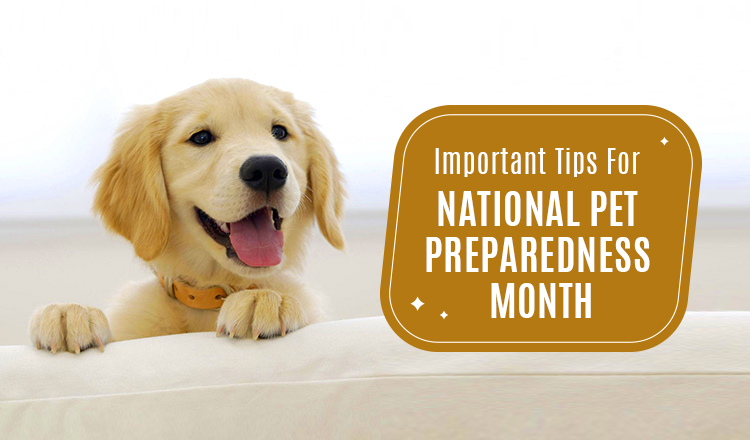June is National Pet Preparedness Month, and it’s the time of year when natural disasters strike more frequently. Although you should be prepared for pet emergencies all year, this month serves as a good reminder to go over your family’s emergency plans and make sure your pets are included. Therefore, we at CanadaPetCare would like to give some tips to all pet owners on how to keep their pets protected during natural disasters and everyday emergencies, especially in the realm of social distancing.
While no one can truly be fully prepared for a disaster, a well-thought-out and versatile strategy can make a significant difference.
Here are some simple preparation tips for you and your pets in the event of an emergency:
1. Identification
One of the most important things you can do to plan is to get your pets correctly marked. Check to see if your pet is microchipped, and if not, make an appointment with your veterinarian to have one installed.
A microchip is a tiny gadget about the size of a grain of rice that is implanted between your pet’s shoulder blades. The device can be scanned at a veterinarian’s office or an animal shelter, and it will show vital details such as your address and phone number. Remember to notify your microchip provider if you switch or alter your phone number so that they can update their records! Check the identification tags are up to date and easy to read.
Another useful tip is to provide details on their tag, such as if they need medication or whether they are allergic to other animals, so that emergency responders can determine the type of treatment they require as they try to reconnect you. It’s also a safe idea to have a recent photo of yourself and your pet in their emergency kit. It could come in handy if you need to describe your pet to a shelter employee or an emergency worker.
2. Be Aware of Your Surroundings
If your area is vulnerable to floods, wildfires, or some other form of natural disaster that requires evacuation, it’s important to find a location outside of the area where you can bring your pets.
It’s a good idea to have a list of choices and contact numbers for where you might go, whether you’re bringing them to a friend’s or family member’s house or to one of the many pet-friendly hotels. And note, if you have to leave your home because of the power outage or its too hot/cold for you to stay, don’t forget about your pets!
3. Don’t Separate
Natural disasters can be terrifying for us, but they can be much more frightening for our pets. When moving them and for the first few days following a disaster, keep them on a leash at all times while outside. Depending on the smells in your area, pets can flee or become entangled in dangerous debris. If your home has been affected, hold cats in a carrier or confine them to an undamaged area; they can surprise you with how small a space they can fit into.
4. Create a Kit
If you need to evacuate your house, having a prepared kit on hand can be extremely useful. A few days of worthy food, bottles of water, extra medicine, copies of veterinarian records, poop bags, cat litter and pan, durable leashes and collars, first aid kit, directory of pet-friendly hotels, bowls, and if your pet has a favorite treat or toy, it never hurts to have an extra on hand for emergencies!
There are several other things to consider; tailor your package to your pet’s specific needs, and note that you can never be too prepared!
5. Important Contacts
If an emergency strikes when you are at work or away from home, it is a good idea to talk about an action to take with a neighbor, friend, or family member who lives nearby. It would be much less stressful if you agree that if one of you is unable to return home, the other will carry your pets and an emergency kit.
Make sure your front door has new stickers that tell emergency personnel how many pets are in the house in case they need to enter to save them. Keep the phone numbers for your veterinarian, pet-friendly hotels, and the Pet Poison Helpline on hand in case of an emergency.
Final Words
No one wants to think that a natural disaster will strike their area, but following these guidelines can ensure that you and your pets are prepared and ready to take advantage of all the fun activities that summer has to offer!





